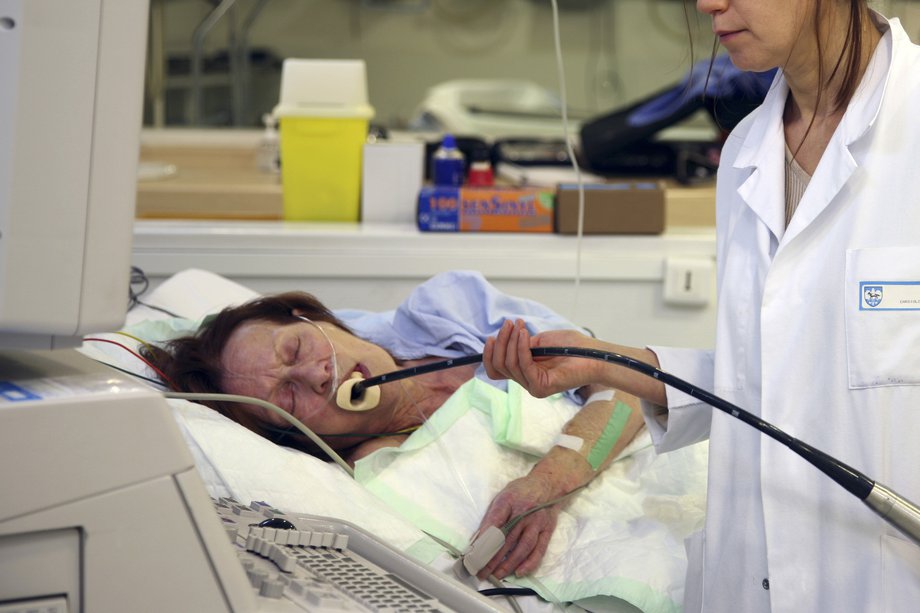Endoscopic Ultrasound (EUS) in Bulgaria
Search and Compare the Best Clinics and Doctors at the Lowest Prices for Endoscopic Ultrasound (EUS) in Bulgaria

Find the best clinics for Endoscopic Ultrasound (EUS) in Bulgaria
No clinics available

- Home
- Bulgaria
WHY US?
At Medijump, we're making medical easy. You can search, compare, discuss, and book your medical all in one place. We open the door to the best medical providers worldwide, saving you time and energy along the way, and it's all for FREE, no hidden fees, and no price markups guaranteed. So what are you waiting for?

Free

Best Price

Widest Selection

Risk-Free
What you need to know about Endoscopic Ultrasound (EUS) in Bulgaria

Endoscopic ultrasound (EUS) is a procedure that allows your doctor to attain information and images of your digestive tract as well as the surrounding tissues and organs. It is used to assess gastrointestinal and lung disease. Endoscopic ultrasound can help in the evaluation of lymphoma, bile duct stones, pancreatic cysts, neuroendocrine tumors, as well as cancer of the esophagus, lung, colon, stomach, pancreas, rectal, and ampullary.
What does a Endoscopic Ultrasound (EUS) Procedure Involve?
During an endoscopic ultrasound, you may be given sedation and anesthetic to help you relax. Then, your doctor will insert an endoscope with a small ultrasound device installed on its tip into your digestive tract. An endoscope is a tiny, flexible tube that has a light and camera attached to its end. The ultrasound will provide more detailed and accurate images than traditional ultrasound.
How Long Should I Stay in Bulgaria for a Endoscopic Ultrasound (EUS) Procedure?
Endoscopic ultrasound is an outpatient procedure, meaning you can leave the hospital immediately after the procedure. However, you will need to stay in Bulgaria for around 7 to 8 days because the detailed results normally take about a week before they are available.
What's the Recovery Time for Endoscopic Ultrasound (EUS) Procedures in Bulgaria?
You will be monitored for about an hour after the procedure. You will be advised to take it easy for the rest of the day. Unless the result shows that you have a serious medical condition, you will be able to get back to your normal routine within a day or two.
What sort of Aftercare is Required for Endoscopic Ultrasound (EUS) Procedures in Bulgaria?
Within the first hour after the procedure, you will only be allowed to drink water. It may take a little longer until you can eat food. There is no special diet or exercise you need to do, except if the result shows that you have a medical condition. You may need a follow-up visit with your local doctor to go over the results.
What's the Success Rate of Endoscopic Ultrasound (EUS) Procedures in Bulgaria?
Several studies show that the rate of complications after an endoscopic ultrasound is very low, meaning it is a very safe procedure. The risks and side effects may include infection and bleeding, but that is very rare.
Are there Alternatives to Endoscopic Ultrasound (EUS) Procedures in Bulgaria?
Since endoscopic ultrasound gives unique and accurate information, there are no real alternatives to this procedure. However, if you do not want to undergo this procedure or if the procedure results in misdiagnosis, traditional ultrasound or X-ray can be an option.
What Should You Expect Before and After the Procedure
Before an endoscopic ultrasound, your doctor may not be able to confirm their diagnosis of your condition. After the procedure, your doctor is provided with precise information regarding your digestive tract, which allows them to evaluate and consider the treatment options for your case.
Whilst the information presented here has been accurately sourced and verified by a medical professional for its accuracy, it is still advised to consult with your doctor before pursuing a medical treatment at one of the listed medical providers
No Time?
Tell us what you're looking for and we'll reachout to the top clinics all at once
Enquire Now

Popular Procedures in Bulgaria
Prices Start From $614

Endoscopic Retrograde Cholangiopancreatography (ERCP)
Prices Start From $614
See prices & compare resultsPrices Start From $131

Prices Start From $47

Recommended Medical Centers in Bulgaria for procedures similar to Endoscopic Ultrasound (EUS)

- Interpreter services
- Translation service
- Religious facilities
- Medical records transfer
- Medical travel insurance
- Health insurance coordination
- TV in the room
- Safe in the room
- Phone in the room
- Private rooms for patients available

- Interpreter services
- Translation service
- Religious facilities
- Medical records transfer
- Medical travel insurance
- Health insurance coordination
- TV in the room
- Safe in the room
- Phone in the room
- Private rooms for patients available

- Interpreter services
- Translation service
- Religious facilities
- Medical records transfer
- Medical travel insurance
- Health insurance coordination
- TV in the room
- Safe in the room
- Phone in the room
- Private rooms for patients available

- Interpreter services
- Translation service
- Religious facilities
- Medical records transfer
- Medical travel insurance
- Health insurance coordination
- TV in the room
- Safe in the room
- Phone in the room
- Private rooms for patients available

- Interpreter services
- Translation service
- Religious facilities
- Medical records transfer
- Medical travel insurance
- Health insurance coordination
- TV in the room
- Safe in the room
- Phone in the room
- Private rooms for patients available

- Interpreter services
- Translation service
- Religious facilities
- Medical records transfer
- Medical travel insurance
- Health insurance coordination
- TV in the room
- Safe in the room
- Phone in the room
- Private rooms for patients available

- Interpreter services
- Translation service
- Religious facilities
- Medical records transfer
- Medical travel insurance
- Health insurance coordination
- TV in the room
- Safe in the room
- Phone in the room
- Private rooms for patients available

- Interpreter services
- Translation service
- Religious facilities
- Medical records transfer
- Medical travel insurance
- Health insurance coordination
- TV in the room
- Safe in the room
- Phone in the room
- Private rooms for patients available

- Interpreter services
- Translation service
- Religious facilities
- Medical records transfer
- Medical travel insurance
- Health insurance coordination
- TV in the room
- Safe in the room
- Phone in the room
- Private rooms for patients available

- Interpreter services
- Translation service
- Religious facilities
- Medical records transfer
- Medical travel insurance
- Health insurance coordination
- TV in the room
- Safe in the room
- Phone in the room
- Private rooms for patients available
Endoscopic Ultrasound (EUS) in and around Bulgaria
Introduction
Bulgaria has plenty to offer and tourists are going to be very impressed with the country’s mountainous landscapes, beautiful Black Sea beaches, fascinating history, friendly locals, lively nightlife, and affordability. Although the country’s holiday tourism is very much on the radar, it is also actually quite popular with medical tourists, due to its modern medical centers, highly trained medical professionals, state-of-the-art equipment, affordable healthcare, and mineral baths, thousands of medical tourists visit this country each year. Most of the medical tourists come for dental treatment, orthopedic surgery, elective surgery, neurosurgery, as well as health screening.
Popular Cities and Regions in Bulgaria
Bulgaria’s laid-back capital city, Sofia, is truly a must-visit. It is full of museums, Ottoman mosques, communist architecture, chic galleries, Eastern Orthodox churches, amazing restaurants, and upbeat clubs. One of the most popular landmarks in the country is the Aleksander Nevski Cathedral, which is an awe-inspiring church built between 1882 and 1912 to honor 200,000 Russian soldiers who died fighting for the independence of Bulgaria during the Russo-Turkish war. If you want to relax on beautiful beaches visit Varna, which is a major tourist destination during the summer. The second-largest, city in Bulgaria is Plovdiv and it is one of the oldest continuously inhabited cities in Europe. Tourists are attracted by the Roman Amphitheatre, Archeological Museum, and Tsar Simeon Central Garden.
Transport in Bulgaria
Most international tourists will arrive at Sofia Airport, which serves flights to most numerous major cities in Europe and the Middle East. There are several budget airlines that operate flights from this airport, including Ryanair and Wizz Air. Domestic flights are available, but they tend to be expensive. Therefore, to travel from one city to another, trains and buses are the best option. Buses and trains are punctual and affordable. However, if you are in a hurry, you should avoid trains as they can be a little slow. To travel around big cities, taxis are widely available and are really cheap. Just make sure you choose a licensed taxi to avoid being overcharged.
Visas in Bulgaria
While Bulgaria is not yet a part of the Schengen Area, it has a visa policy that is based on the Schengen system. Therefore, holders of Schengen Visa are allowed to enter the country. Additionally, citizens of 62 countries, including the US, Australia, and the UAE, can stay in the country for up to 90 days without a visa.
Weather in Bulgaria
From June to August, Bulgaria experiences summer. The weather can get a bit hot and humid, with an average temperature of 19°C to 21°C. July is the wettest month in the country. Winter, from December to February, is usually freezing. Autumn and Spring bring pleasant weather.
Additional Info
- Local Currency: The official currency is the Bulgarian Lev (BGN). 1 USD will get you approx. 1.8 BGN.
- Money & Payments: You can find ATMs in every city in the country. Credit cards are accepted in bigger restaurants and hotels. Tipping is sometimes expected.
- Local Language: Bulgarian is the official language in Bulgaria. Turkish and Roma are spoken by a minority of people. English is becoming more and more common in the country, but it is not widely spoken.
- Local Culture and Religion: Christianity dominates the population of Bulgaria, followed by Islam and Judaism.
- Public holidays: Bulgaria celebrates several historical and religious holidays, such as Orthodox Good Friday, Orthodox Easter Day, Independence Day, Culture and Literacy Day, Christmas Day, and Liberation Day.
Popular Searches
- Plastic Surgery in Thailand
- Dental Implants in Thailand
- Hair Transplant in Thailand
- Breast Augmentation Thailand
- Gastric Sleeve in Thailand
- Gender Reassignment Surgery in Thailand
- Laser Hair Removal in Bangkok
- Botox in Bangkok
- Dermatology in Bangkok
- Breast Augmentation in Bangkok
- Coolsculpting in Bangkok
- Veneers in Turkey
- Hair Transplant in Turkey
- Rhinoplasty in Turkey
- Stem Cell Therapy in Mexico
- Rhinoplasty in Mexico
- Liposuction in Mexico
- Coolsculpting in Tijuana
- Rhinoplasty in Korea
- Scar Removal in Korea
- Gastric Sleeve in Turkey
- Bone Marrow Transplant in India
- Invisalign in Malaysia
- Plastic Surgery in the Dominican Republic
- Tummy Tuck in the Dominican Republic
- Plastic and Cosmetic Surgery in Poland
- Rhinoplasty in Poland
- Hair Implant in Poland
- Dental Implants in Poland
- IVF in Turkey